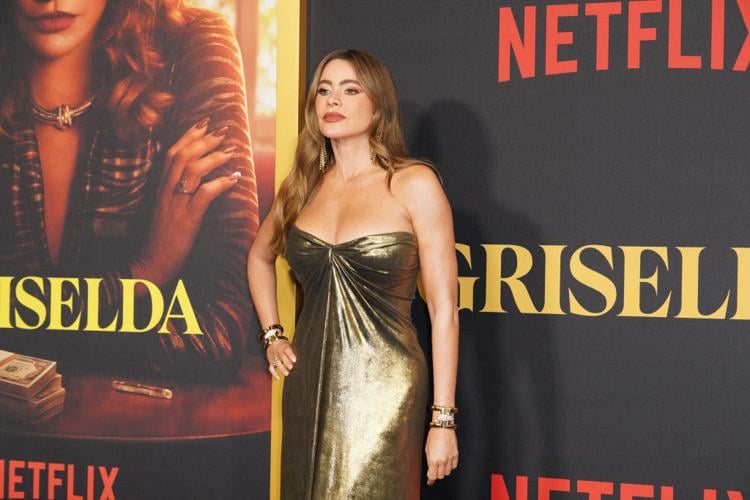
Sofía Vergara attends the 'Griselda' premiere at Callao Cinema in Madrid, Spain.
The new Netflix show “Griselda” features Sofia Vergara as Griselda Blanco, the drug lord from Colombia who was active from the 1970s to early 2000s in Miami.
The limited series kicks off with Griselda Blanco and her children fleeing Medellín, Colombia where they fly to Miami, Florida to stay with Griselda’s friend Carmen Gutiérrez (Vanessa Ferlito) until Griselda can “get back on her feet.”
It is the way that she tries to survive and “make a living,” that gives her story a controversial aspect. When Griselda sneaks a kilo of cocaine in her son’s luggage to sell, her drug enterprise begins. To help her business grow, she invites her close friends, Isabel (Paulina Dávila), Arturo Mesa (Christian Tappan) and a few sex worker colleagues to sell her product. In the midst of that, her brother-in-law Fernando is hunting her down to enact revenge after Griselda killed her husband, Alberto. The series continues to cover her rise and fall as a drug lord.
Sofia Vergara did an outstanding job to fulfill a strong role. She was able to channel the “black widow,” as the drug queen was also known, by her transformation as Griselda. With hours of prosthetics, hair and make-up, it was easier to see Vergara as someone else. Vergara’s dedication to perform as Griselda Blanco comes from being born and raised in Colombia. She grew up during Griselda’s drug reign of terror. Sadly, her brother succumbed to the life of selling drugs and was one of Griselda Blanco’s victims. With her personal experience, she had the rampage to fuel her acting.
Vergara’s cohorts also did a remarkable job in portraying Griselda's friends and foes in the series. Some of the cast include Karol G portraying sex worker “Carla,” Alberto Guerra portraying Griselda's third husband “Darío Sepúlveda,” José Zúñiga as “Amilcar,” a rival drug lord to Griselda, and many more. The whole cast of “Griselda” did a phenomenal job in their roles.
The filmography and attention to detail on the show really stand out. The film style and props sell the time frame of the late 70s to 80s in the show. As time jumps progressed throughout, the show, props and costumes also followed through. Just like its counterpart, “Narcos,” the show mostly consisted of Spanish dialogue with English subtitles.
The biggest setback of the show is painting Griselda like an anti-hero. There are moments during the show that viewers can find themselves rooting for Griselda rather than grimacing at her horrible actions.

From left: Aurora Cossio, Sofia Vergara, Karol G, Paulina Davila and Juliana Aiden Martinez attend Netflix's "Griselda" US premiere in Miami, Florida.
There are two sides that can be reflected in the show, one being the horrors of Griselda Blanco’s reign and the other as uplifting Griselda portraying her as a “girl boss.” It perpetuates the idea that Griselda was justified in her actions. Another thing to note is that the real life Griselda Blanco had no remorse for the lives she sacrificed, whereas in the series Vergara portrayed Griselda as a person who felt like she “had” to do this, essentially painting Griselda as a woman in protest of the gender roles in the cartel industry. This ties in how Pablo Escobar was portrayed in “Narcos,” where he was also portrayed as being justified in his actions. Considering both shows were done by Netflix, it is no wonder why that narrative is still carried on.
On the other hand, some can argue she did all her illegal activity solely for the upbringing of her kids and providing them with a better life, other than being a sex worker. When fleeing from her husband, her priority was her children just like that of any other mother. But she also wanted revenge against her brother-in-law. Once living in Miami, Griselda solely focused on gaining power and making money, conjuring up a team of bodyguards who would protect her and kill for her if she said the word. Griselda even went as far as attempting to kill a witness in order to gain the partnership of Amilcar, the drug cartel leader in Miami before Griselda.
To counter the ideology of validating Griselda’s actions, is “Detective June Hawkins,” portrayed by Juliana Aidén Martinez. June gains the lead that the murders connected to Griselda are not being done by a man but a woman on the accounts of witness statements. In the show, Hawkins is looked down on for being a female officer and was used mostly as a translator. That is until she is able to break through and “stick it to the man” by proving that Griselda is the cartel leader, and she then earns her place.
Another thing to note is that at the beginning of the first episode, it opens with a quote from Pablo Escobar reportedly saying “The only man I was ever afraid of was a woman named Griselda Blanco.” Many viewers may be unaware of Blanco and Escobar's timeline and reign. The possible interactions between the two are not completely clear. There are rumors of their relationship but nothing was ever clarified.
Overall, “Griselda” was very entertaining and informative explaining the life of the “godmother of cocaine,” Griselda Blanco. The biggest issue that remains now is how Netflix is cultivating an environment to root for the bad guy. Although it does hit its marks, it romanticizes the life they lived and the lives they took in order to gain this power. However, to cross the line of a documentary or drama, this may be one of the few ways to keep the audience engaged.
With the recent release of “Griselda,”, Blanco’s remaining son, Michael Corleone Blanco, sued Netflix for “unauthorized use of likeness” in hopes of halting the release of the show. Blanco claims that he was actively working on finding the right team to write a book and film a show to document his mother’s life. However, if the intent is to bridge the gap between documentary and drama, this may be one of the few ways to keep the audience engaged













(0) comments
Welcome to the discussion.
Log In
Keep it Clean. Please avoid obscene, vulgar, lewd, racist or sexually-oriented language.
PLEASE TURN OFF YOUR CAPS LOCK.
Don't Threaten. Threats of harming another person will not be tolerated.
Be Truthful. Don't knowingly lie about anyone or anything.
Be Nice. No racism, sexism or any sort of -ism that is degrading to another person.
Be Proactive. Use the 'Report' link on each comment to let us know of abusive posts.
Share with Us. We'd love to hear eyewitness accounts, the history behind an article.